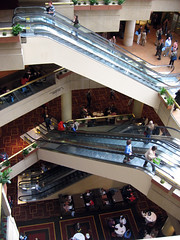April 19th, 2007 Brian Herzog
On the final day of cil2007, most of the workshops I attended ending up having a common theme – tailoring library services to patrons needs, based on patron input.
The first of these sessions was called “Catalogs/OPACs for the future,” led by Roy Tennant (California Digital Library) and Tim Spalding (LibraryThing.com). Tim followed up on points he made in yesterday’s presentation with some criteria that future library search systems will need:
- catalogs should be fun - patrons should enjoy searching for and finding books and information
- allow linking into the records - use permalinks so links to items will never expire or break
- link outwards - everything in the catalog should be links (titles, names, subjects, tags, keywords, etc). Participating in the wider web means our entries are not dead ends for patrons, but helps them flow through our catalog to the information they ultimately seek. Tim also encouraged linking to sites Amazon.com and Wikipedia - they offer lots of information, and our patrons use them anyway, so we should not position ourselves as a barrier
- dress up the catalog - this goes along with “catalogs should be fun,” and what he meant was that the catalog should be as visually-appealing as possible - loads of book covers, nice design and layout, useful widgets to display new books, recent searches, and even patron data (if they so choose)
Roy followed Tim, and also had general criteria for a catalog of the future
- do not call it an “opac” – even “catalog” is getting outdated, because they should provide access to more than just the library books we own
- searching should be simple – a single search box, placed strategically and logically on the page, should search in all available resources
- individual libraries could get rid of local catalogs and use Open WorldCat as a single union catalog for all libraries. This would promote comprehensive searching and resource sharing, and is also better because it includes articles and web resources indexed through WorldCat (in the Q&A session, one librarian pointed out that WorldCat has a few important shortcomings [they stand to benefit financially from this model, they do not include many small public libraries], and she got a round of applause)
- separate the ILS from the finding tool. The ILS will be smaller and just for staff use, and the finding tool will be an efficient and comprehensive search tool that sits draws together the ILS and other resources
- communicates well with other systems, so data can be shared freely and all available resources (books, databases, websites, etc) can be searched
- include sophisticated features, such as results ranking, faceted/cluster browsing, preference filtering, etc.
catalog, catalogs, Catalogs/OPACs for the Future, cil 2007, cil2007, libraries, library, library thing, librarything, librarything.com, oclc, opac, opacs, open worldcat, public libraries, public library, roy tennant, tim spaulding, worldcat, worldcat.org
Tags: catalog, catalogs, Catalogs/OPACs for the Future, cil 2007, cil2007, Conferences, libraries, Library, library thing, librarything, librarything.com, oclc, opac, opacs, open worldcat, public libraries, public library, Resources, roy tennant, Technology, tim spaulding, worldcat, worldcat.org
Posted under Uncategorized | Comments Off on CIL2007 Wednesday – Catalogs/OPACs for the Future
April 17th, 2007 Brian Herzog
 Even though cil2007 has already been going on for two days, today felt like things really got started. I ended up spending as much time in the exhibit hall as in the sessions, talking to vendors and other librarians. Which is unusual for me, but I learned quite a bit today.
Even though cil2007 has already been going on for two days, today felt like things really got started. I ended up spending as much time in the exhibit hall as in the sessions, talking to vendors and other librarians. Which is unusual for me, but I learned quite a bit today.
Today's sessions were good. The first was about the South Carolina State Library's experience with migrating their website to the Joomla CMS. It wasn't as in-depth and "here's how we did it" as I had hoped, but they did talk a bit about frustrations and surprises they encountered along the way, which is good to hear before starting a project. I am hoping to sometime in the future help convert my library's website from static html to something more dynamic, rssy and all 2.0'd out, and seeing what CMSs are out there helps.
This session complimented nicely the next two I attended – Comments in Catalogs, and then an overview of LibraryThing (and the new LibraryThing for Libraries). This entire track focused on modernizing libraries' approach to web stuff, and how we can best communicate with patrons – primarily by making sure we look at this communication as a two-way street.
For instance, opening up our websites and catalogs to allow for patrons to comment directly on our materials not only involves patrons in their libraries by giving them ownership, but also provides us with invaluable social data on how and why our materials are used.
And it was this social data that Tim Spaulding is mining and using with LibraryThing. Regular people know what they think of books. Tim's entire approach has been to let people associate keywords with specific books, and then let the groupings of those keywords speak for themselves. With the widget that is the basis of LibraryThing for Libraries, those groupings, (in the form of tags generating lists of similar books, suggested reading lists, etc) speaks loudly.
If we would only listen. As Tim pointed out, library ILSs and opacs, and the traditional vendors that supply them, are not really listening. Neither is Amazon. These are all companies trying to make money (which is why Amazon is not the ultimate book website. LibraryThing is for readers and about books, whereas Amazon is for booksellers and about making money). But improving the usefulness of our catalogs with third-party plug-ins is a step in the right directions, and hopefully these obviously necessary add-ins will soon becomes standard fare of the big ILS interfaces – or smaller solutions like Scriblio.
Interspersed between sessions I was talking to exhibitors, learning more about what library systems could replace Horizon, and what public pc/print station management software options are out there. I talked to quite a few, and need to sift through my notes (some other time) before I remember what's what.
After the conference we got a personal tour of Alexandria, VA, dinner in the Old Town at the Union Street Public House, and then enjoyed Free Cone Day at Ben & Jerry's. Tomorrow is much more conferencing, and then flying back to Boston, if the weather allows.
alexandria va, cil 2007, cil2007, conference, conferences, libraries, library, library thing, librarything, public libraries, public library, scriblio, social data, tim spaulding
Tags: alexandria va, cil 2007, cil2007, conference, Conferences, libraries, Library, library thing, librarything, public libraries, public library, scriblio, social data, Technology, tim spaulding
Posted under Uncategorized | Comments Off on CIL2007 Tuesday

